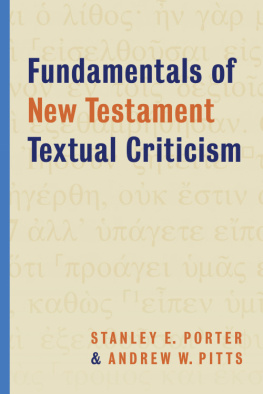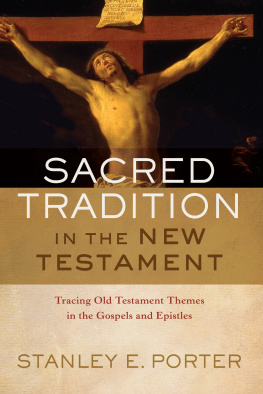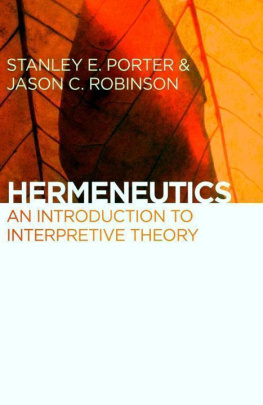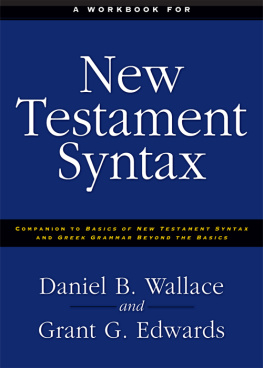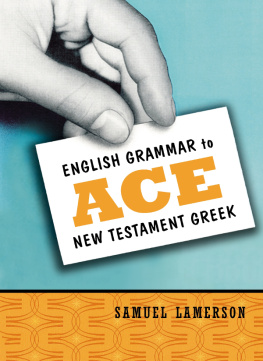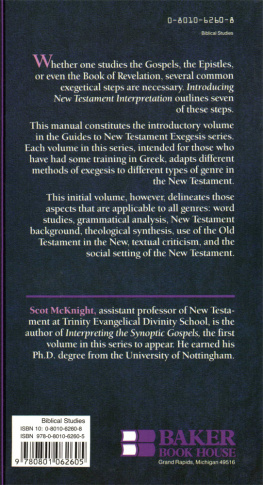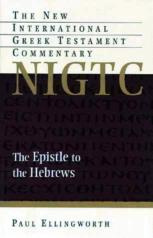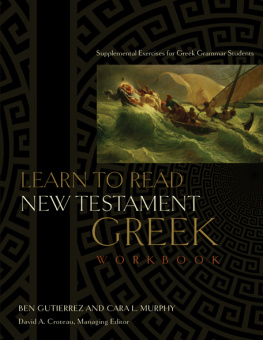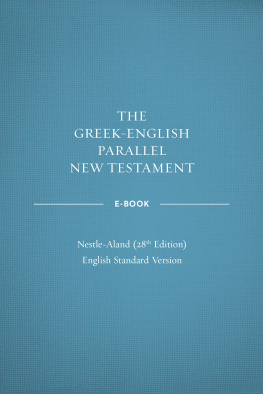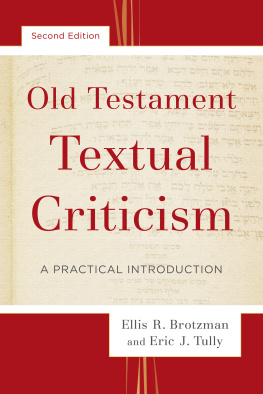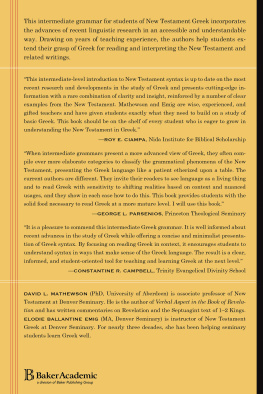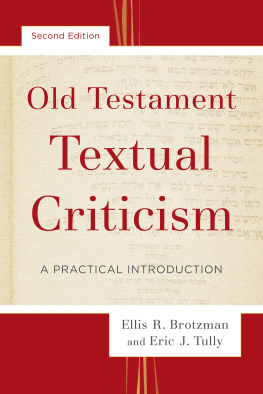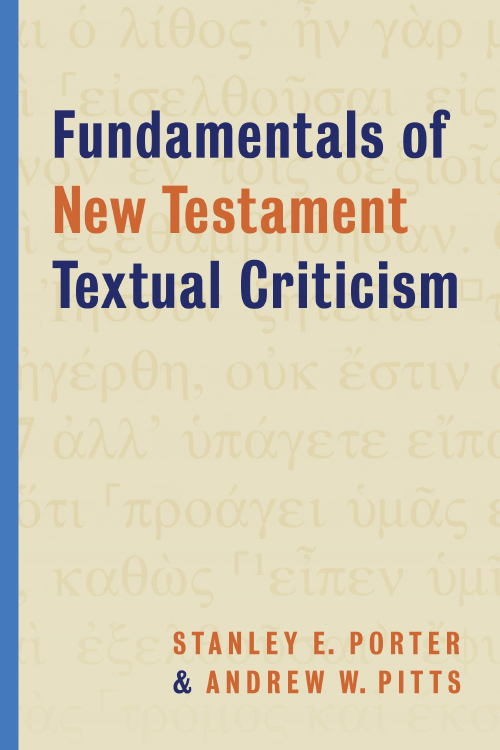
Fundamentals of New Testament Textual Criticism is an excellent treatise on a vitally important subject. Stanley Porter and Andrew Pitts were seeking to produce a textbook that falls midway between Bruce Metzgers Text of the New Testament and my own New Testament Textual Criticism: A Concise Guide, and they have succeeded brilliantly. Their careful research deepens our understanding of the role of textual criticism in exegesis, and I am confident that this book of theirs will be widely used both inside and outside of the classroom.
David Alan Black
Southeastern Baptist
Theological Seminary
Porter and Pitts have admirably achieved what they set out to do provide a succinct introduction to the manuscript tradition of the Greek New Testament for first- and second-year students of Koine Greek. This book is ideal both for students in classrooms and for general readers who seek reliable information about the origins and the text of the New Testament.
Eckhard Schnabel
Gordon-Conwell
Theological Seminary
In this book Stanley E. Porter and Andrew W. Pitts take interested students by the hand and introduce them to the essentials of New Testament textual criticism. They provide welcome, concise assessments of external and internal evidence for judging textual variants. A very useful tool for instructing students in New Testament textual criticism.
Thomas J. Kraus
University of Zurich
Fundamentals of New Testament Textual Criticism
Stanley E. Porter & Andrew W. Pitts
W ILLIAM B . E ERDMANS P UBLISHING C OMPANY
G RAND R APIDS, M ICHIGAN / C AMBRIDGE, U . K .
2015 Stanley E. Porter and Andrew W. Pitts
All rights reserved
Published 2015 by
Wm. B. Eerdmans Publishing Co.
2140 Oak Industrial Drive N.E., Grand Rapids, Michigan 49505 /
P.O. Box 163, Cambridge CB3 9PU U.K.
Library of Congress Cataloging-in-Publication Data
Porter, Stanley E., 1956
Fundamentals of New Testament textual criticism /
Stanley E. Porter & Andrew W. Pitts.
pages cm
Includes bibliographical references and .
ISBN 978-0-8028-7224-1 (pbk.: alk. paper); 978-1-4674-4321-0 (ePub); 978-1-4674-4281-7 (Kindle)
1. Bible. New Testament Criticism, Textual. I. Title.
BS2325.P67 2015
225.486 dc23
2014049876
www.eerdmans.com
Contents
This book is the product of two people interested in a common task teaching others about textual criticism, within the context of advancing knowledge of New Testament Greek working together to achieve that aim. We leave others to decide whether we have accomplished that goal. However, we have enjoyed the process from start to finish, as we have refined this work and developed it according to our goals of providing the fundamentals of textual criticism for those who are interested and serious about learning this important area. As the notes and bibliography make clear, we are very interested in this topic, as well as the Greek language in general, and come to the writing of this book on the basis of having done serious work in textual criticism. We hope that we have learned enough along the way to make the process of learning easier for others.
We realize that the writing of a book like this is never the work of just one or, in this case, two people. We would also like to thank a number of people for their work with us in trying to ensure that we have got our facts straight, and, more importantly, that we have pitched this book at the right level to provide the kind of book that we have envisioned. Thus we would like to thank Will Varner, Karl Armstrong, Bryan Fletcher, and Cliff Kvidahl, who read the entire manuscript and offered thoughtful comments and ideas that made the volume better in many ways. Cliff was especially helpful in working on issues related to the format and images for the volume.
This volume, as its title Fundamentals of New Testament Textual Criticism indicates, is designed as part of the series of Greek language resources being published by Eerdmans. Previous volumes in that series include Stanley E. Porter, Jeffrey T. Reed, and Matthew Brook ODonnell, Fundamentals of New Testament Greek (2010) and Porter and Reed, Fundamentals of New Testament Greek: Workbook (2010). We are in the process of writing an intermediate grammar that continues to develop this learning curriculum, as well as a book on exegesis and interpretation. We wish to thank Eerdmans for their support of this entire project, including all of its component volumes. To this end, we wish to thank Michael Thomson at Eerdmans, as well as his excellent colleagues there.
Finally, we wish to thank our various supporting institutions for their help in making this work possible. We also wish to thank our wives, Wendy and Amber, for their love and unstinting support. We could not do what we do without them and it would not be nearly as rewarding or pleasurable.
S TANLEY E . P ORTER & A NDREW W . P ITTS
Both of the authors of this book have taught Greek language and exegesis for a number of years one of them over the course of a career of twenty-five years at undergraduate, seminary, and graduate levels. One consistent challenge to us as we have selected textbooks for these classes is the lack of a book that addresses the fundamentals of New Testament textual criticism and important related issues that is neither too advanced nor too elementary. In other words, we have written this distinctly midlevel textbook on New Testament textual criticism for interested and serious students and with recent scholarly discussion in pertinent areas in mind. Books like Bruce Metzgers classic, The Text of the New Testament (4th ed., rev. Bart D. Ehrman; Oxford: Oxford University Press, 2005 [1964]), and Kurt and Barbara Alands Text of the New Testament (2nd ed.; Grand Rapids: Eerdmans, 1989), or more recently David Parkers Introduction to the New Testament Manuscripts and Their Texts (Cambridge: Cambridge University Press, 2008), while all very helpful, are far too detailed for the first-year or second-year Greek student. At the same time, books like David Alan Blacks New Testament Textual Criticism: A Concise Guide (Grand Rapids: Baker, 1994) or J. Harold Greenlees Introduction to New Testament Textual Criticism (rev. ed., 1993; repr. Peabody: Hendrickson, 1995) seem too abbreviated to us, not providing enough detailed information or exposure to major issues for the student. Paul Wegners Textual Criticism of the Bible (Downers Grove, IL: InterVarsity Press, 2006) in some ways improves upon these but, probably due to its focus upon both Testaments, leaves many areas in New Testament textual criticism untouched. Not only were the textbooks with which we were familiar either too detailed or too abbreviated, but we observed no midlevel textbooks that introduced students to the main debates within textual criticism and addressed issues such as canon and translation theory, discussions that we like to include in our first- and second-year Greek courses (especially for first-year students in a seminary context).
Out of a desire to use a book that captures these many elements for our first- and second-year Greek students, this book was born. It is intended for students who are in the process of studying or have had at least one year of New Testament Greek or its equivalent (e.g., Classical Greek) and desire to begin learning the principles of Greek exegesis, and specifically textual criticism. This book has been written to function as an excellent companion for Stanley Porter, Jeffrey Reed, and Matthew Brook ODonnells
Next page
